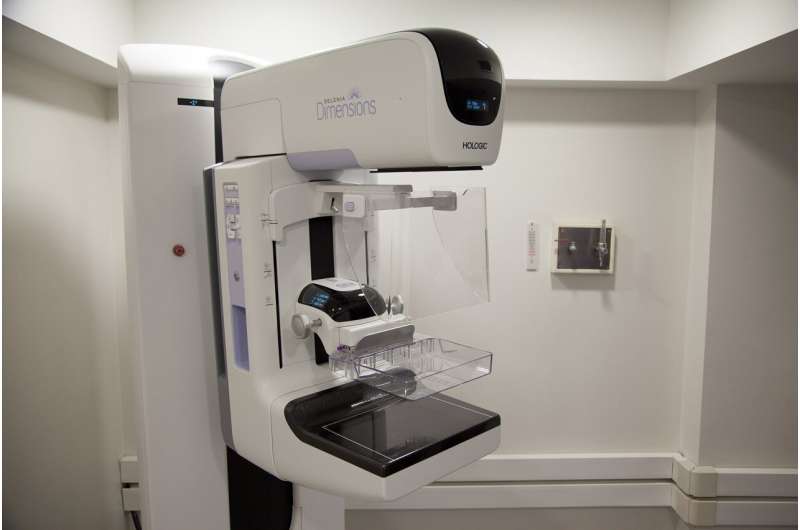This article has been reviewed according to Science X's editorial process and policies. Editors have highlighted the following attributes while ensuring the content's credibility:
fact-checked
trusted source
proofread
Some breast cancer survivors may safely de-escalate mammography three years after surgery

Women 50 or older who de-escalated to less-frequent mammography three years after curative surgery for early-stage breast cancer had similar outcomes to women who received annual mammography, according to results from the Mammo-50 trial presented at the San Antonio Breast Cancer Symposium, held December 5–9, 2023.
Both U.S. and U.K. guidelines recommend annual breast cancer screening following surgery to remove early-stage breast cancer; in the U.S., annual mammography is recommended indefinitely, and in the U.K., it is recommended for five years, followed by screening every three years for patients 50 years and older.
However, the optimal screening schedule has yet to be evaluated in large clinical trials, and long-term annual screening may not be necessary, explained Janet Dunn, Ph.D., a professor of clinical trials at the University of Warwick in the U.K.
"De-escalation of mammographic surveillance reduces the burden on the health care system, decreases the inconvenience for women having to undergo these mammograms, and reduces the associated stress of waiting for results," Dunn said. She added that screening-related anxiety is known to be worse for breast cancer survivors compared to women without a history of breast cancer.
In the phase III Mammo-50 trial, Dunn and colleagues enrolled 5,235 women who had undergone curative surgery to remove their cancer, were free of recurrence three years post-surgery, and were 50 years or older at the time of diagnosis.
Participants were randomly assigned 1:1 to receive annual mammography or less-frequent mammography, defined as every two years in patients who underwent breast conservation surgery and every three years in patients who had a mastectomy.
After five years of follow-up, the breast cancer-specific survival was 98.1% and the overall survival was 94.7% among patients in the annual mammography arm. For patients receiving less frequent mammography, the breast cancer-specific survival was 98.3%, and the overall survival was 94.5%. Similarly, at five years, 5.9% of patients in the annual mammography arm and 5.5% of patients in the de-escalation arm had experienced a recurrence. These results show that de-escalation did not worsen the outcomes.
Compliance with the assigned mammography schedule was lower among patients assigned to the de-escalation arm (69%, compared to 83% among patients assigned to the annual arm), but a sensitivity analysis confirmed that this had no effect on the conclusions.
Additionally, a concurrent sub-study performed annual evaluations of patients' quality of life—including measures of mental well-being, distress, and other concerns—using four validated questionnaires; no differences were detected between trial arms.
"The trial demonstrated that the outcomes from undergoing less frequent mammograms were no worse than undergoing annual mammograms for this group of women," Dunn said. "It is important to carry out these types of trials to streamline services where possible while not disadvantaging patients."
Limitations of this study include the applicability exclusively to patients over age 50 at diagnosis who are three or more years post-surgery.




















